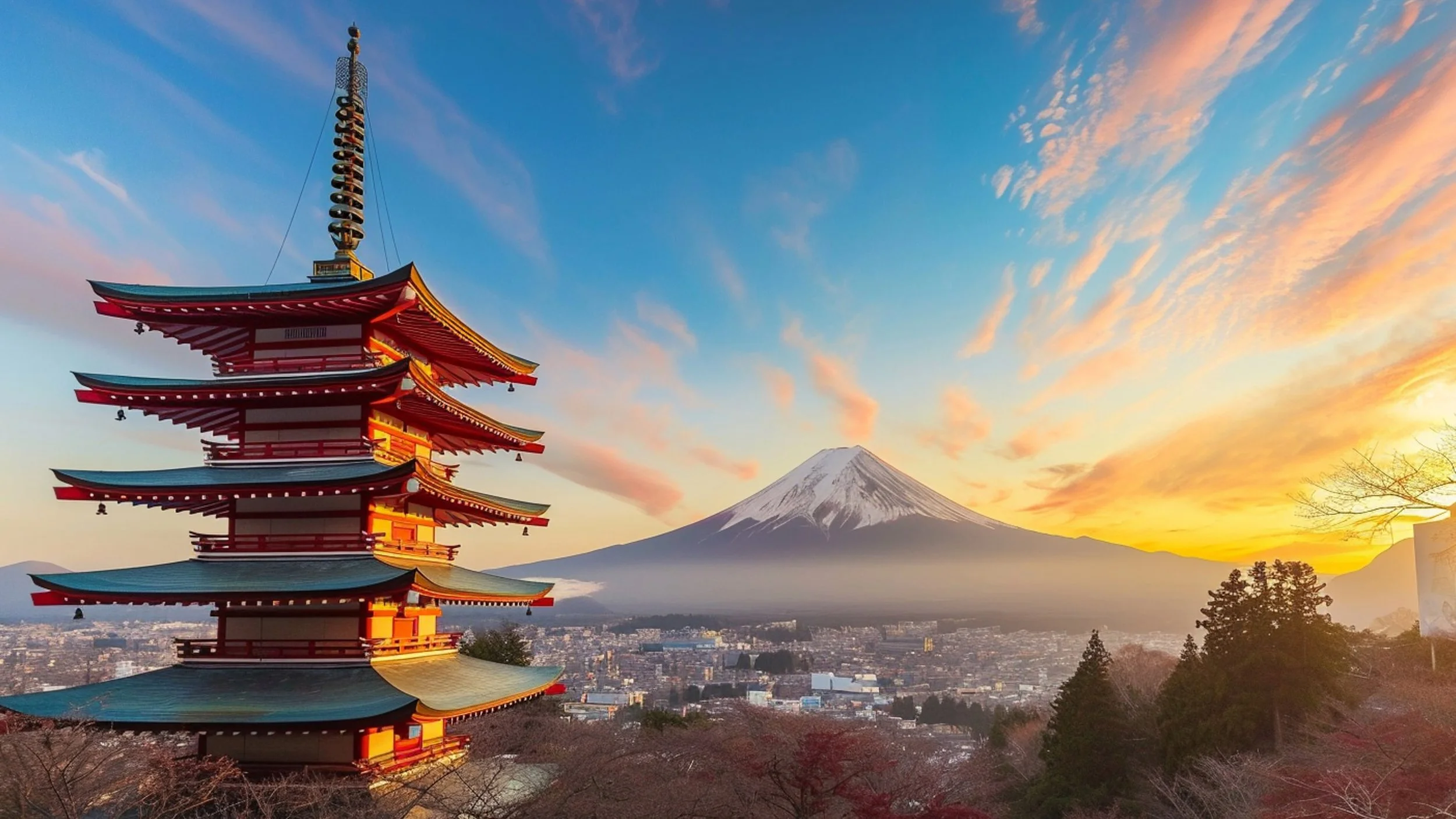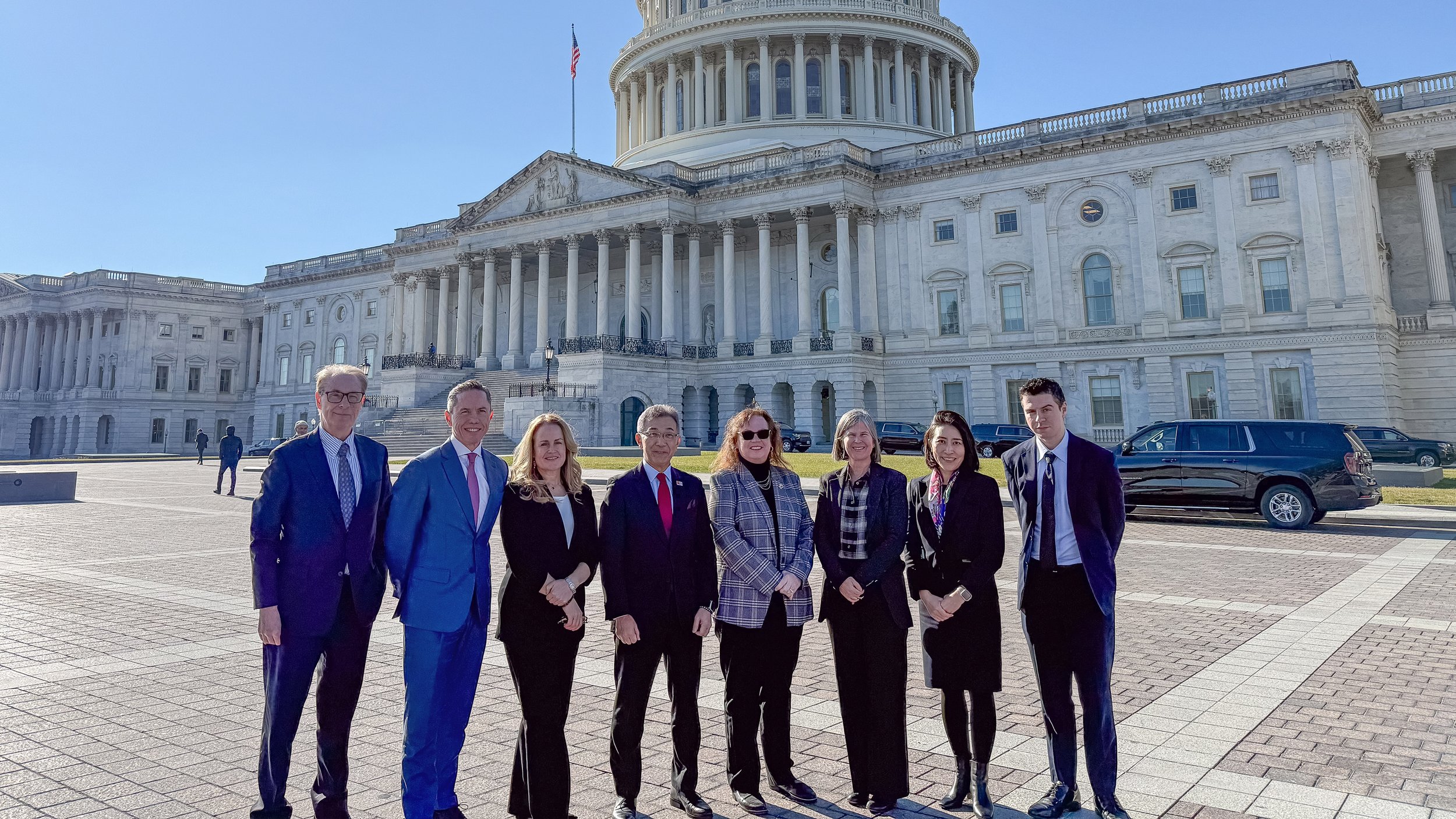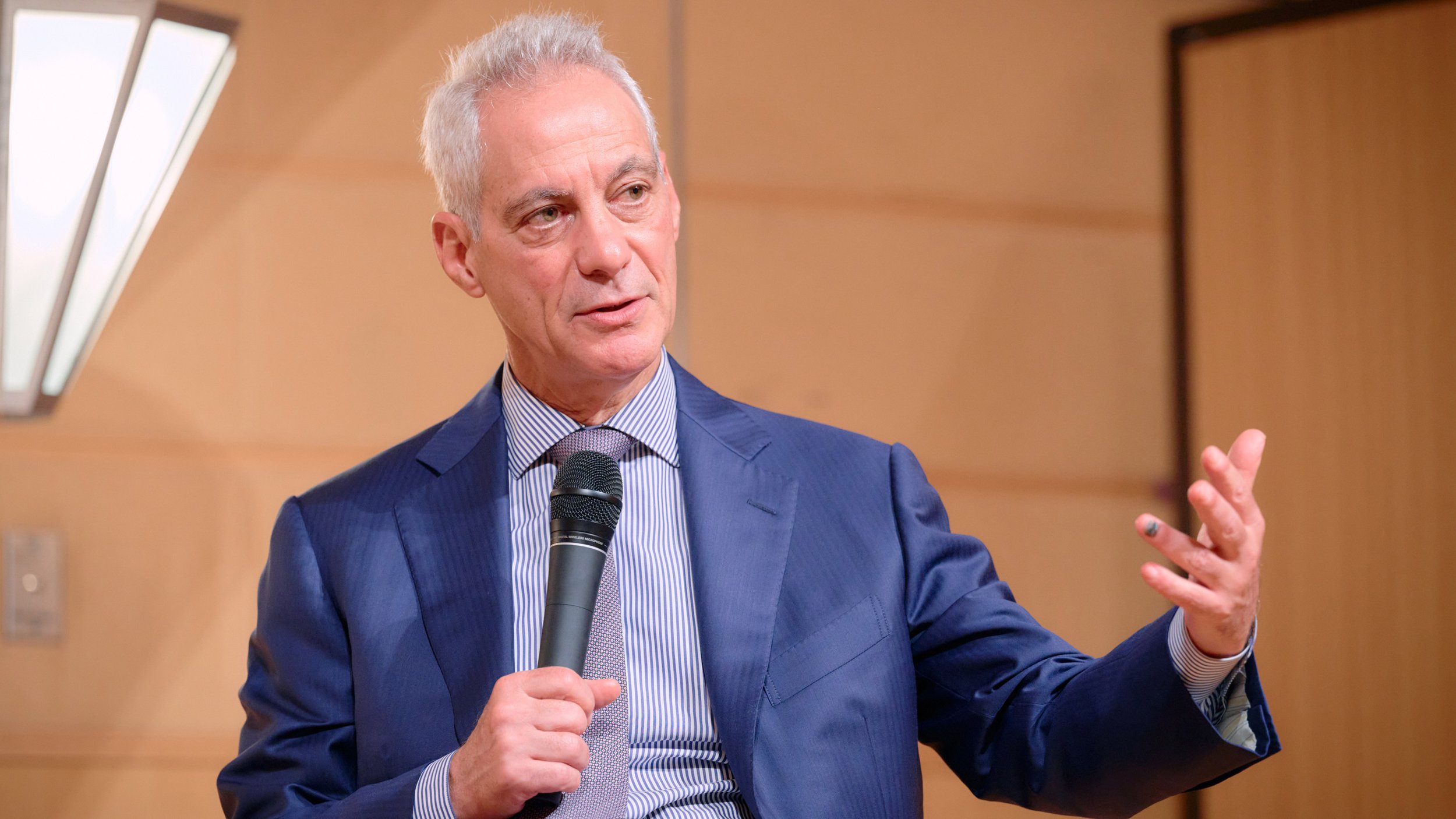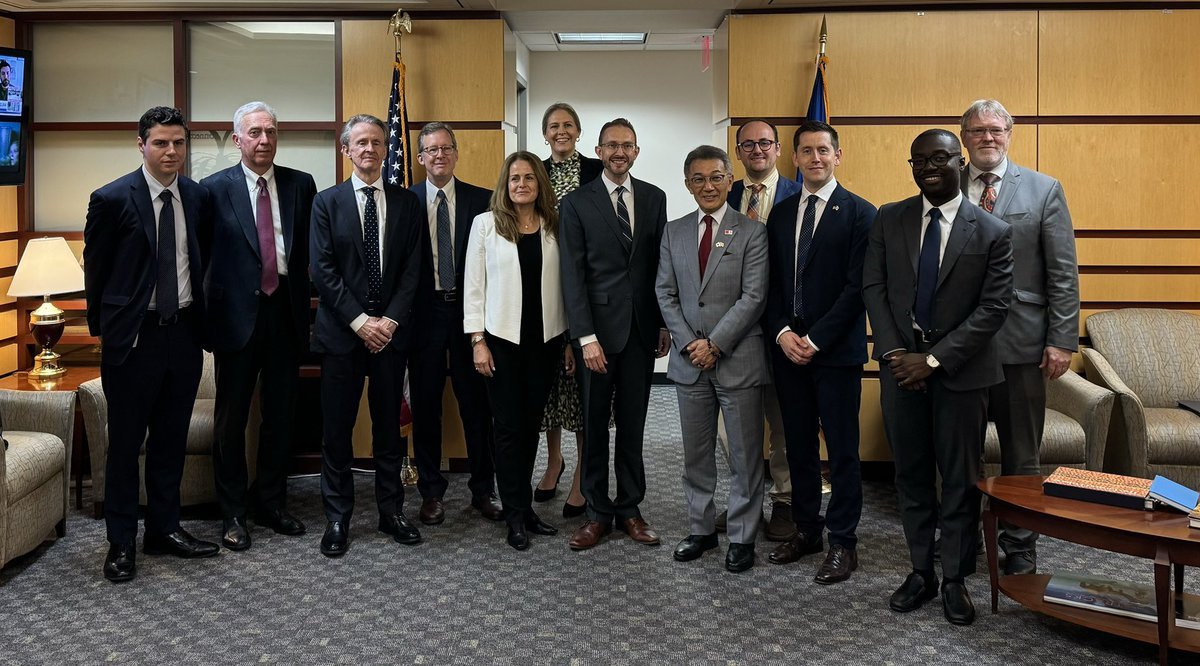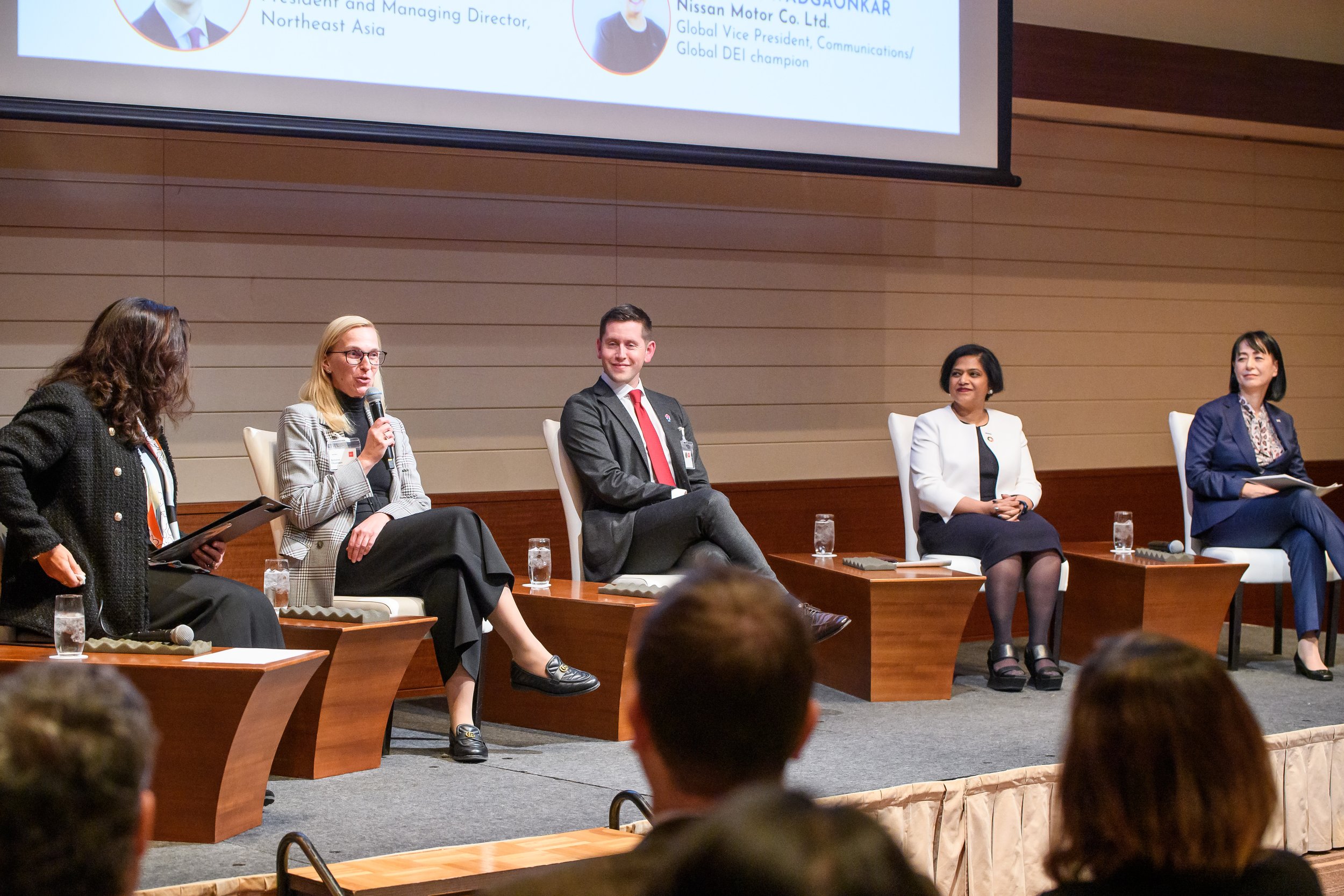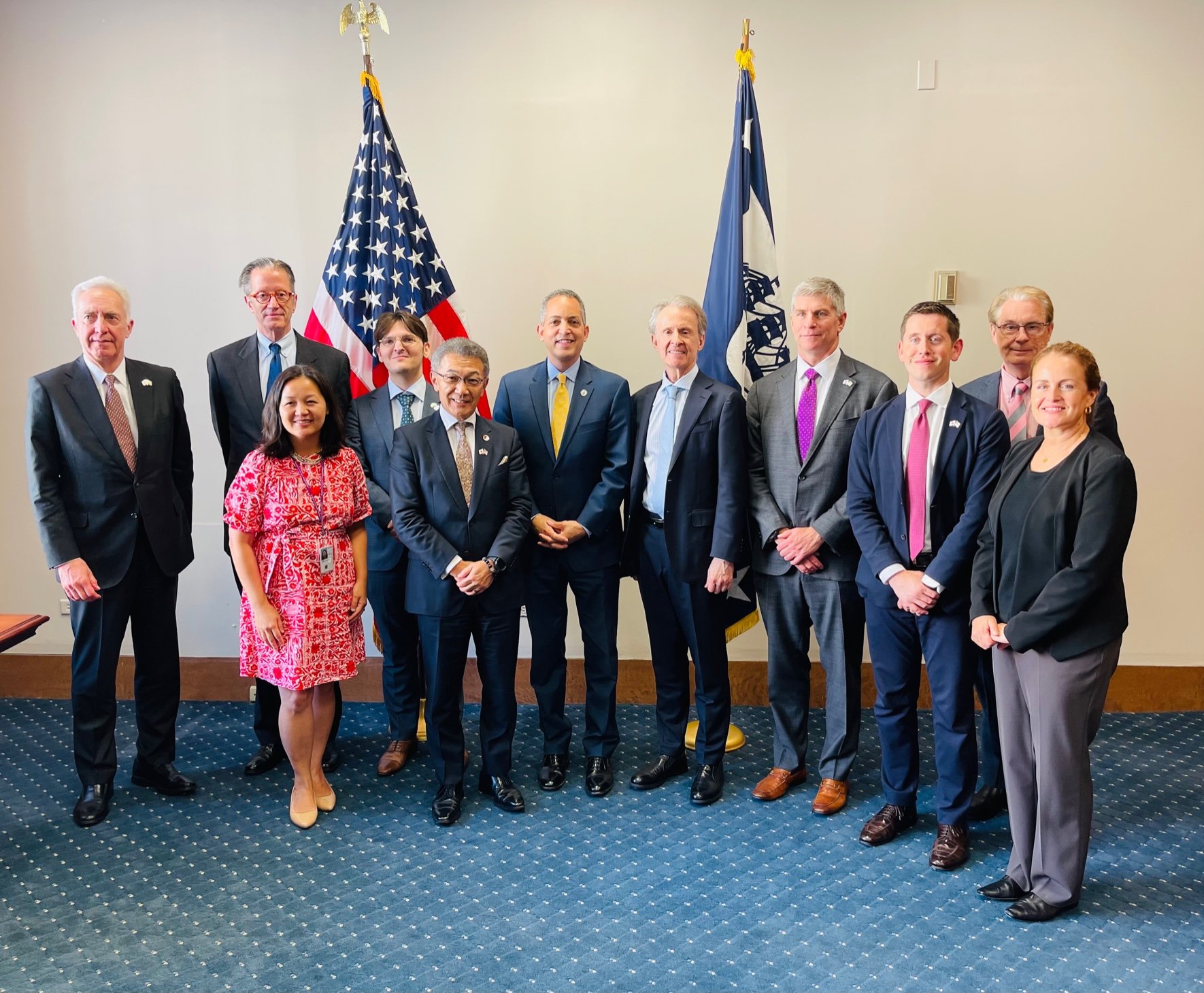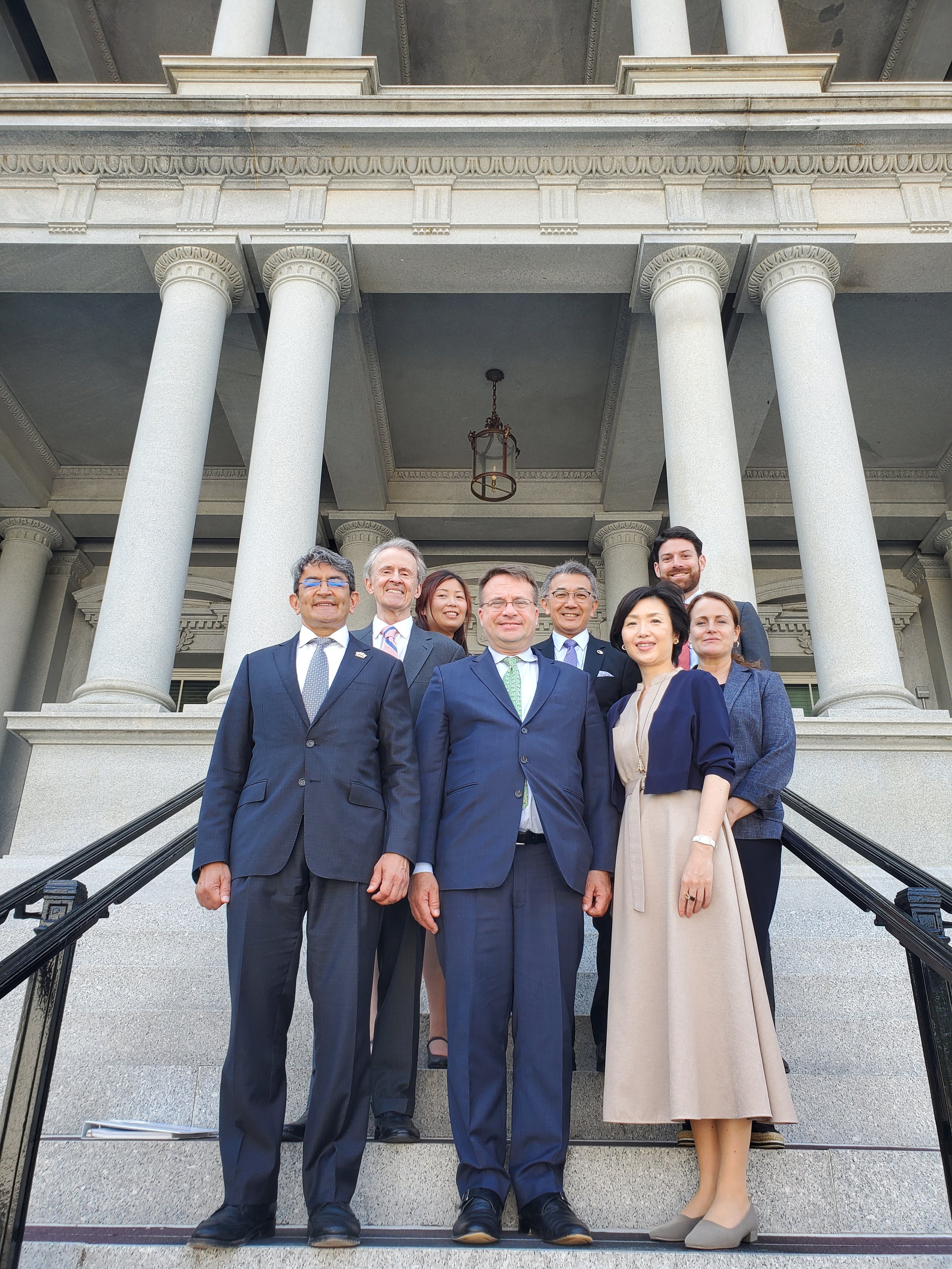Pax Nipponica
With Japan uniquely positioned to emerge as a true 21st-century global leader, Jesper Koll asks who will write the rules governing our future?
Why Japan is best positioned to lead a changing world.
Japan is in a unique position to emerge as a true 21st-century global leader. Clearly, the world is becoming increasingly polarized, confrontational, and uncertain. Who will write the rules governing our future? In my view, no nation is better placed than Japan to mediate between the two current superpowers, the United States and China. This is true for all aspects of policy leadership, not just trade, finance, and economy but also diplomacy and global security.
The primary lesson of the 21st century so far is that neither Pax Americana nor Pax Sinica is an acceptable solution for much of the world. Yes, there is intensifying rivalry between the two, but for different reasons. Neither Washington nor Beijing offers a credible answer to the aspirations of the Global South or the problems facing old-world Europe. And the more both Washington and Beijing leaders insist on a with-us-or-against-us approach to their allies, the greater the resentment against the hegemon will grow. Trust is eroding fast. In contrast, a Pax Nipponica would almost certainly be welcomed by the world. Japan has what it takes to mediate and moderate a new world order. Japan is the honest broker the world can trust.
To be sure, my vision of a Pax Nipponica is a next step evolution from the Pax Britannica (1815–1914) and the Pax Americana (1945–???). Both Britain and America ruled the world by brute force: Their currencies were the undisputed anchor currencies of the global financial system; their leading companies were the undisputed innovators and oligopolistic leaders of global commerce; their universities attracted and educated the best and brightest from all over the world; and their armies were the most advanced and dominant. Today’s Japan has none of this. There is literally no area in both hard and soft power where Japan dominates the world. And that’s precisely why Pax Nipponica is possible.
Japan is not threatening, not feared; but it is admired. Japan is the world’s only true post-industrial society, a frontrunner in many areas. It is a role model for having engineered the fastest and most successful economic development ever, for having a socio-economy resilient enough to survive the biggest deflation cycle in history without suffering social unrest and disruptive inequality. It is now teaching the world how to age gracefully and how to maintain and create equitable prosperity by enhancing asset income rather than relying primarily on employment income.
All over the world, Japan is admired for its exemplary balance between intense economic modernization and solid perseverance of national traditions and social norms; for having not just imported Western culture, but perfected and improved upon it in so many areas—from architecture and fashion to food and video games, and even sports such as male and female figure skating, golf, and baseball.
Make no mistake: Viewed from a global perspective, Japan is the most highly respected nation and culture in the East, West, North, and South of this world. Japan has what it takes to lead a global Pax Nipponica.
What’s Next for Japan?
What about the domestic perspective? Is Japan’s elite ready to lead and orchestrate a global Pax Nipponica? It is, of course, not quite right for a non-Japanese to answer this question. I personally think the answer should be yes. This is because the world desperately needs a trusted and honorable mediator, now more than ever. More importantly, in my view, the country stands at a historic inflection point—Japan needs to embrace and rally behind a new goal. Post-war, post-bubble, post-deflation, post-lost decades—Japan knows what’s behind it, but doesn’t quite know where to go from here.
It is not a coincidence, in my view, that the Liberal Democratic Party (LDP) has once again lost control of parliament, just as they did in the early 1990s when Japan had a similar breakpoint in the zeitgeist once the overarching post-war goal of catching up to the United States had been achieved. Now the overarching post-bubble goal of ending deflation and, at the same time, gracefully restructuring the baby boomer salarymen-based corporate culture has also been completed. Then as now, the LDP has no answer to “What’s next for Japan?”
Beyond the Settlement
When I arrived in Tokyo almost 40 years ago, then-Prime Minister Yasuhiro Nakasone was promoting his Comprehensive Settlement of the Post-War Accounts (Sengo Seiji no Sokessan). To me, as a German national, a lot of Nakasone’s arguments and reasoning made sense. To this day, I very much admire his central demand that there must be more to Japan’s national ambitions than economic centrism (keizai chushin shugi), and that Japan should unmark itself as a defeated country and build a post post-war system.
However, I have always been puzzled by how inward-looking, how narrowly focused on only Japan the elite’s call to settle post-war accounts has been. No global aspirations, no vision, and no demands on Japan’s elite to leverage the country’s strength and wisdom to build a better world and promote a better humanity.
Forty years ago, this was perhaps understandable, because Japan’s elite still needed to muster strength to say no to America: it was a big deal when Sony founder Akio Morita and then LDP heavyweight Shintaro Ishihara published an article by that title—「NO」と言える日本—in 1989 in Japanese. The English version was released in 1991. Was Japan’s elite really ready to revolt against their US masters, or was this just a sign of bubble-empowered hubris? Either way, it was all “no” with zero insights or vision of the new “yes” for which Japan should strive.
But that was then. In 2026, Japan has a unique opportunity to reset national ambitions and goals. It’s not about saying yes or no to America (or China). The world is waiting for Japan to say, “We propose to do it this way.” Japan has what it takes to be a global rulemaker and mediator between East and West, North and South. Pax Nipponica is an ambition the world is waiting for, and one Japan’s elite should embrace. As a Japan optimist, I hope they will.
Advancing Dialogue
A delegation of seven leaders from the American Chamber of Commerce in Japan (ACCJ) traveled to Washington, DC in December for the 2025 DC Doorknock. The visit carried forward momentum from April’s DC recon trip and reinforced the chamber’s sustained engagement with US policymakers.
ACCJ leaders make their most extensive post-pandemic Washington visit.
A delegation of seven leaders from the American Chamber of Commerce in Japan (ACCJ) traveled to Washington, DC in December for the 2025 DC Doorknock. The visit carried forward momentum from April’s DC recon trip and reinforced the chamber’s sustained engagement with US policymakers. Representing the digital, aerospace and defense, energy, and finance, sectors, the group carried a unified message that reflected both recent progress and the work that still lies ahead in the bilateral economic relationship.
Over two days, the delegation completed one of the most comprehensive DC schedules the ACCJ has executed in recent years. Meetings included four US senators and senior officials at the Departments of Commerce, Treasury, and State, as well as the Office of the United States Trade Representative (USTR) and other key agencies. These conversations allowed the ACCJ to reaffirm support for the administration’s recent achievements, including the US–Japan trade agreement and the successful Japan summit, while underscoring persistent nontariff barriers detailed in the ACCJ’s recent submissions to the USTR.
ACCJ President Victor Osumi noted the significance of this year’s program. “The Doorknock is one of our most important advocacy tools because it gives us direct insight into US priorities while allowing us to elevate the voice of American business in Japan,” he said. “This year’s meetings showed real momentum, and I left Washington encouraged by how open officials were to our ideas and how eager they were for continued dialogue.”
A central theme throughout the visit was the shift in Washington from dealmaking to execution. Officials emphasized that implementation is still in its early stages and encouraged the ACCJ and its member companies to play a role in proactively identifying opportunities for investment in the two nations. They also highlighted ongoing efforts to build secure supply chains for critical minerals and emerging technologies, and expressed interest in supporting member companies in advancing these goals.
There was additionally broad interest in Japanese Prime Minister Sanae Takaichi and how her premiership may shape the next stage of US–Japan relations. The delegation returned to Tokyo with a clear mandate to continue driving member priorities during this important period of transition.
Capitol Discourse
On April 23 and 24, ACCJ President Victor Osumi, Chairman Christopher LaFleur, and Executive Director Laura Younger visited the US capital to meet with members of the administration.
ACCJ leaders visit Washington to better understand the road ahead.
From left: ACCJ External Affairs Manager for US Government Affairs Joey Vetter, Executive Director Laura Younger, President Victor Osumi, Japanese Ambassador to the United States Shigeo Yamada, and ACCJ Chairman Christopher LaFleur
Dialogue is the cornerstone of effective advocacy, and staying in touch with what is happening in Washington is essential for the American Chamber of Commerce in Japan (ACCJ) to effectively support its members and the wider business community.
On April 23 and 24, ACCJ President Victor Osumi, Chairman Christopher LaFleur, and Executive Director Laura Younger visited the US capital to meet with members of the administration.
The delegation also met with Japanese Ambassador to the United States Shigeo Yamada and officials from the Embassy of Japan and visited external organizations, including:
- The Department of Commerce
- The Office of the US Trade Representative
- The Department of the Treasury
- The National Security Council
- The Heritage Foundation
- The American Enterprise Institute
- The America First Policy Institute
- The US Chamber of Commerce
- McLarty Associates
A range of issues were discussed, including the US administration’s core priorities in trade negotiations with Japan and the ACCJ’s recent feedback to the U.S. Trade Representative suggesting that a reduction of non-tariff trade barriers would be an effective way to promote sustainable growth.
“We met with several key stakeholders on the ground in Washington who are encouraged by the continued strong investment in both our nations, across numerous industries,” said Osumi. “Japan is a vital US partner in the Indo–Pacific region, offering significant opportunities for US businesses. This enduring alliance drives productive economic dialogue between our two countries. The ACCJ will continue to advocate for policies that advance the most important bilateral partnership in the world amid a period of rapid change.”
The ACCJ delegation with Senior Advisor for Global Markets at the US Department of Commerce Kevin Manning and Acting Assistant Secretary of Commerce for Global Markets and Executive Director of SelectUSA Ashok Pinto (second and third from left)
Alliance Maker
As US Ambassador to Japan Rahm Emanuel prepares to hand over the reins to a new envoy, he talks to The ACCJ Journal about the experience, the importance of the alliance, and the future.
ACCJ Person of the Year Rahm Emanuel reflects on three years as the US ambassador to Japan
After being tapped by US President Joe Biden to serve as the nation’s ambassador to Japan, Rahm Emanuel arrived in Tokyo in January 2022 at a pivotal moment for the world. The Covid-19 pandemic was raging, Japan’s border closures were wreaking havoc on the business community, and the ripple effects were exposing vulnerabilities across the region.
Strengthening the bilateral relationship was essential. During his time as chief of mission, Emanuel has tirelessly worked to build bonds that foster a prosperous future not only for the United States and Japan, but for the entire Indo–Pacific.
In recognition of his strong support, the American Chamber of Commerce in Japan named Emanuel its 2024 Person of the Year and honored him with a special event on October 23 at Tokyo American Club.
As he prepares to hand over the reins to a new envoy, the 31st US ambassador to Japan talks to The ACCJ Journal about the experience, the importance of the alliance, and the future.
How can the business community strengthen the US–Japan alliance?
The US–Japan alliance is far from limited to our far-reaching security cooperation and the alliance’s place at the heart of a new latticework of security partnerships across the Indo–Pacific. That, of course, is fundamental to our relationship and to our collective deterrence in the region, but the United States and Japan have made strides on every front over the past three years.
As the largest foreign direct investor in each other’s economies, our two nations are persistently pursuing opportunities to forge closer links in business and research. In the fast-evolving environment of emerging technologies, our tech firms and academic institutions have the opportunity to lead the way in the research and development of artificial intelligence (AI), quantum computing, semiconductors, and other cutting-edge scientific fields.
But just as important as technological advances are our measures to protect them. This means tightening our export controls to ensure that technologies such as advanced AI chips don’t end up in the hands of adversaries with malign intentions. Ultimately, this is about securing our intellectual property, our economies, and the jobs of tomorrow.
“As the largest foreign direct investor in each other’s economies, our two nations are persistently pursuing opportunities to forge closer links in business and research.”
Of course, we need to ensure we have the relevant education programs in place to train the workers who will be shaping these 21st-century technologies. The United States and Japan have made real progress in this area through partnerships between tech companies and universities. We now need to keep up the momentum by continuing to expand and enhance these talent pipelines.
Investment is the fuel of great business ideas and ambitious thinking. Since the United States has a flourishing venture capital ecosystem, there are boundless opportunities for cooperation in this area between US and Japanese companies. Japan has long been a source of innovation and invention. It’s just a matter of finding the funding to ensure those ideas can take flight.
One area with huge potential is Japan’s biotechnology sector. An increasing number of start-ups are drawing interest from investors here. With greater collaboration and support from US biotech enterprises, and investors with expertise in the sector, Japan can become a leading biotech hub, not just in Asia but globally.
How do talent hurdles and gaps in DEI and marriage equality impact the alliance’s economic strength?
Japan faces the dual challenges of a rapidly aging society and a declining birthrate, which means that the country doesn’t have a person or a talent to lose when it comes to winning the 21st century.
Every country, including the United States and Japan, has a long way to go in fully implementing the principles of diversity, equity, inclusion, and accessibility. But if we are to build well-functioning societies and thriving economies, we need to leverage all our assets. It’s about properly and fairly employing the people we have and embracing an ethos of lifelong learning, upskilling, and retraining.
How can we best collaborate on AI?
Looking at the speed at which AI is being developed and adopted, there is no time to lose in ensuring the United States, Japan, and our allies remain at the forefront of this technology. It is imperative that we set the pace in its continuing evolution and in establishing a fully functioning, well-regulated ecosystem that is aligned with our laws and interests. The sector is already seeing a lot of research and development cooperation and cross-border investment between the United States and Japan. Having talked to many major players in the field, I am confident that this trend will only grow.
During former Prime Minister [Fumio] Kishida’s state visit to Washington in April, we saw the launch of an initiative between US and Japanese universities and private sector partners in both countries to boost AI-focused research and workforce development.
The partnerships between Carnegie Mellon and Keio Universities, and between the Universities of Washington and Tsukuba, are supported by $110 million in investment from Microsoft and other US concerns as well as a consortium of nine Japanese companies.
Similar partnerships between Japanese and US universities and leading tech companies were launched in the fields of semiconductors and quantum computing last year. Both programs are about making groundbreaking advances that will have global benefits while educating the workforce of tomorrow.
Empowering our best and brightest in these critical fields will pay dividends both for our two nations and the world.
How can cooperation on climate change and clean energy be strengthened?
Two of the greatest challenges facing us all are climate change and energy security. Just as in so many other sectors, the United States and Japan are well placed to combine their respective scientific expertise in the development of new and cleaner energy technologies.
Earlier this year, Japan became the first international collaborator in America’s Floating Offshore Wind Shot initiative, which aims to reduce costs associated with the energy source. Having committed ¥120 billion to the development of wind technology and launching the Floating Offshore Wind Technology Research Association (FLOWRA) this year, Japan clearly recognizes the enormous potential of offshore wind.
Our two countries are also partnering on advanced small nuclear reactor technology, for which demand is only set to increase as we build more data centers to power generative AI. Meanwhile, Japan’s largely untapped geothermal energy resources hold tremendous opportunities for further collaboration between Japanese and US energy corporations.
These areas of private sector cooperation and investment not only reinforce our energy security but also offer us opportunities for growth in other markets, as we join forces to help developing countries devise their own clean energy solutions and infrastructures.
How important has the US–Japan Year of Tourism been following the border closures?
While the news in Japan is dominated by the record-breaking numbers of inbound tourists, the number of Japanese tourists visiting the United States continues to rise following the pandemic. Destinations such as Hawaii and New York City remain extremely popular, and, thanks to a certain Japanese baseball player by the name of Shohei Ohtani, Los Angeles—and Dodger Stadium, in particular—welcomed thousands of fans over the course of the MLB season this year. With Shohei recently named the National League’s MVP, we can expect to see even more Japanese travelers heading to California and elsewhere in the States when the 2025 season kicks off.
There are few places in the world with the sheer diversity of natural wonders and cultural and culinary experiences. Next year’s Expo 2025 in Osaka will be a chance to truly showcase all that the United States has to offer. Our interactive pavilion is designed to inspire visitors to learn more about the United States, explore the country in person, and even consider studying there. We expect the expo to help boost visitor numbers to the United States in 2025 and in the years ahead.
The recent agreement to establish Japan as our 18th Global Entry partner country couldn’t come at a better time, and is sure to enhance the travel experience of Japanese visitors to the United States. Since Japan is our largest foreign direct investor, and Japanese companies employ nearly a million Americans, it makes good business sense to make entry as straightforward and as stress-free as possible for pre-approved visitors. This latest agreement is another reflection of the strength of our bilateral ties.
How important was the Biden–Kishida summit?
[Former] Prime Minister Kishida’s state visit in April ushered in a new era for the alliance. It cemented the work we had been doing for the previous two years to deepen our cooperation in a multitude of areas. Security might be a key pillar of our partnership, but we are leveraging our strengths to drive innovation and growth on every front, from energy and education to science and space exploration. The United States and Japan, as President Biden reiterated during the state visit, are global partners whose endeavors and achievements are being felt across the Indo–Pacific and beyond.
The alliance is now at the heart of a new latticework of multilateral partnerships across the Indo–Pacific. By replacing our “hub-and-spoke” architecture of regional bilateral relationships with multilateral cooperation and consensus, we have built an energized environment of trust and dynamism in the region.
The historic trilateral partnerships we forged with Japan and South Korea and with Japan and the Philippines—as well as the work of the Quad strategic grouping of the United States, Japan, India, and Australia—boost our deterrence in the Indo–Pacific while providing renewed momentum for greater cooperation and integration between countries and economies. One thing is for certain: There is much more to come in the years ahead.
“What we do over the next three years will determine our presence and our vision over the next 30 in the region.” That line from my confirmation hearing in 2021 turned out to be my guiding principle during my time here.
How might Japan’s new political landscape impact bilateral cooperation?
Our efforts over the past three years to strengthen the US–Japan alliance, and to reassure allies and partners that the United States is a permanent Pacific power and presence, have received universal support from across the political spectrum on both sides of the Pacific.
There is a clear understanding in Japan and in the United States that the alliance forms the bedrock of our collective deterrence in the region, and that continued cooperation with other regional partners and allies is critical to confronting a China that seems intent on dominating its neighbors and forcing the region to play by its rules.
How has Japan changed your view of America?
Distance has given me perspective on both America’s strengths and challenges. My first few weeks in Tokyo were certainly eye-opening. Seeing people leave valuables on tables or benches while they went to get coffee or jog around the Imperial Palace revealed a level of social trust I had never witnessed before.
Equally bewildering—but beautiful—was the sight of young schoolchildren walking alone to and from school each day, with cars coming to a complete stop when children raised their hands in the air before crossing the road. Those scenes highlight to me how much kids in the United States have been robbed of their innocence. We make so many compromises and concessions for our safety in America. It’s been liberating to be free of that constant and nagging concern.
What I have been repeatedly reminded of while here is the dynamism of America’s entrepreneurial ecosystem. Our unique and unrivaled environment of venture capital firms and angel investors is what drives innovation and invention.
Our university research programs and private-sector tie-ups are unmatched, too. It’s no surprise that so many entrepreneurs, start-ups, and scientists gravitate to the United States—a place that embraces risk, encourages expression, and champions big thinking.
What is your message to the next ambassador?
The past three years have been about shoring up alliances, building multilateral partnerships, and strengthening our security commitments. With a firm framework now in place, the years and decades ahead will be about developing those strategic relationships and initiatives further while ensuring that the stability of the Indo–Pacific is protected and its economic vibrancy preserved.
2024 DC Doorknock
During the 2024 DC Doorknock, ACCJ delegates met with leaders in Washington, DC, to discuss security, economic, and strategic partnerships.
The 2024 ACCJ DC Doorknock delegates gather in front of the US Capitol.
From June 3 to 6, American Chamber of Commerce in Japan (ACCJ) leaders made their visit to Washington, DC, as part of the chamber’s annual DC Doorknock visits. These trips are an important part of the ACCJ’s advocacy efforts and strengthen US–Japan relations.
ACCJ President Victor Osumi was joined by Special Advisor Steve Briggs, Governor Hans Klemm, Chairman Christopher LaFleur, Executive Director Laura Younger, and Bank of America's Tamao Sasada.
Diversity & Inclusion Summit Series Day 3
The ACCJ hosted its first in-person Diversity & Inclusion Summit since the pandemic on Day 3 of the "Unleashing the Power of Inclusion" series.
Participants in the first in-person Diversity & Inclusion Summit since the pandemic gathered on Day 3 of the Unleashing the Power of Inclusion series.
The ACCJ hosted its first in-person Diversity & Inclusion Summit since the pandemic on November 28. Day 3 of the series was entitled Unleashing the Power of Inclusion.
The event, held at the Intercontinental Hotel Osaka, featured a panel discussion with:
- Simone Thomsen, president and representative director, Eli Lilly Japan K.K.
- Steve Briggs, president, Northeast Asia, Kraft Heinz
- Haruko Watanabe, representative director, president, and chief executive officer, American Home Assurance Company, Ltd.; director and vice chairman, AIG Japan Holdings KK
- Lavanya Wadgaonkar, global vice president, communications and global DEI champion, Nissan Motor Co. Ltd.
- Nuala Connolly, head of talent, DEI country lead, and deputy head of HR, AIG Japan
Hosted by the Kansai Diversity & Inclusion, Women in Business, and Kansai Business Programs Committees, the three days of training sessions, workshops, and discussions aimed to create safe and inclusive environments in the workplace.
2023 DC Doorknock
During the first full DC Doorknock since 2019, ACCJ delegates met with leaders in Washington, DC, to discuss security, economic, and strategic partnerships.
The 2023 ACCJ DC Doorknock delegates gather in front of the US Capitol.
On September 12 and 13, American Chamber of Commerce in Japan (ACCJ) leaders made their first full visit to Washington, DC, since the start of the coronavirus pandemic. These DC Doorknock visits are an important part of the ACCJ’s advocacy efforts and strengthen US–Japan relations.
ACCJ President Om Prakash was joined by Vice Presidents Jason Hyland and Victor Osumi; Governors Hans Klemm, Frank Packard, and Will Shaffer; Treasurer Steven Briggs; Special Adviser Christopher LaFleur; Digital Forum Vice-Chair Kristopher Tate; and Executive Director Laura Younger.
The delegation was warmly welcomed by administration officials, members of Congress, and officials from the Embassy of Japan and the US Chamber of Commerce. Topics of discussion included security, economic, and strategic partnerships.
2022 DC Doorknock
ACCJ leaders made their first DC Doorknock visit to Washington since before the pandemic June 14–16. View a selection of photos from the event.
From left: ACCJ Executive Director Laura Younger, President Om Prakash, Chair Eriko Asai, and Governor Victor Osumi
American Chamber of Commerce in Japan (ACCJ) leaders made their first DC Doorknock visit to Washington since before the pandemic June 14–16. ACCJ President Om Prakash was joined by Chair Eriko Asai, Governor Victor Osumi, Special Advisor Christopher LaFleur, and Executive Director Laura Younger as they engaged face-to-face with members of the executive branch and Congress.
The annual DC Doorknock, which was canceled in 2020 and 2021 due to Covid-19, is an important part of the ACCJ’s dialogue with the US Government and is key to the chamber’s advocacy efforts. The delegation received a warm welcome from administration officials, members of the Senate and House of Representatives, the Embassy of Japan, the US Chamber of Commerce, and various think tanks.
“There’s energy and urgency in the US–Japan partnership on all fronts—from the economy to national security,” said Prakash, “[and] we are pleased and encouraged to see the United States leading in the region, and the heightened role Japan has taken on the world stage.”
Make Japan a Startup Nation
If you had two minutes with the new prime minister, to give your best-shot advice on how to create a better economic future for Japan, what would you say? From a macro perspective, by far the best answer is: Do whatever you can to make Japan a startup nation. But where does economic growth come from? Not from the stuff politicians and technocrats talk about most of the time—e.g., monetary, fiscal, or trade policy. And importantly, it doesn’t come from population growth. It comes from entrepreneurs.
How can government best encourage economic growth?
If you had two minutes with the new prime minister, to give your best-shot advice on how to create a better economic future for Japan, what would you say?
From a macro perspective, by far the best answer is: Do whatever you can to make Japan a startup nation.
But where does economic growth come from? Not from the stuff politicians and technocrats talk about most of the time—e.g., monetary, fiscal, or trade policy. And importantly, it doesn’t come from population growth. It comes from entrepreneurs.
Clear-Cut Correlation
History has confirmed again and again that we only get sustained economic growth when human ingenuity and ambition are allowed and encouraged, and people are empowered to start an enterprise and build their own business.
China long had one of the world’s highest rates of population growth, but it only started becoming an economic miracle when the Communist Party encouraged entrepreneurship and private business in the early 1980s.
More generally, the numbers speak for themselves. When you analyze the world’s 40 leading economies over the past 30 years, you find a clear-cut correlation between the percentage of entrepreneurs in the adult population and the sustainable growth of the country’s gross domestic product (GDP). More entrepreneurs create higher sustainable growth. In fact, if you raise the number of entrepreneurs in the population by one percentage point, your potential GDP goes up by about half a percent.
In even simpler terms, employment data confirms the positive power of entrepreneurship: startups have created 60–70 percent of new jobs in G7 countries over the past 20 years. Specifically, here in Japan, new companies set up after 2010 have provided about 2.3 million jobs over the past decade. In contrast, companies older than 20 years actually destroyed some 800,000 jobs over the same period.
So, dear prime minister, make no mistake—startups and entrepreneurship are a nation’s single most important source of growth and prosperity.
Finding Founders
The need for entrepreneurs is clear, but where do they come from?
Unfortunately, there is no magic bullet, no one simple policy tool that can be turned on to deliver entrepreneurs and create Startup Nation Japan. However, the key ingredients are all in place and, in my personal view, I firmly believe Japan stands at the brink of a golden age of entrepreneurs and startups.
Why? It’s a combination of cyclical and structural forces. Cyclically, the Covid-19 crisis has not only freed up resources but, more importantly, has become a catalyst for many people to rethink their career and life priorities. No matter how small, a startup can finally hire people and build teams, investing in what always yields the highest returns for any new venture: human capital. One of the biggest obstacles for growth and expansion has finally disappeared.
Even the most techy of tech companies, such as Google or Amazon, did not grow by the force of their superior algorithms, business models, or charismatic leadership vision. Instead, they grew as a result of the sweat equity and animal spirits of their team leaders, sales managers, and back-office clerks who pulled all-nighters. Elon Musk’s biggest problem is not tech, engineering, or digital transformation; it is his teams, the people who actually get stuff done.
In Japan, the bar for startups to attract talent has always been especially high because top graduates strongly prefer established companies. Bigger is supposedly safer. Here again, the current recession may well mark an important turning point. Not a week goes by that we don’t read about establishment companies announcing a restructuring plan. All of a sudden, big-company job security is not what it used to be. This is great news for entrepreneurs.
To be specific, I have the good fortune of working as an adviser and angel investor for a couple of Japanese venture capital funds. Over the past six months, all the startups with which we deal have grown their staff and partners. Several have more than doubled the size of their teams. Most importantly, the quality of potential candidates has grown enormously.
One young woman from a top establishment company, who has had no overseas or global experience, told me: “Working at my current employer has been great, but now that I know how good I am, and what I want, staying there puts me at risk. I don’t want to be reassigned to some random project by some random salaryman superior. I want to create my own destiny. Your startup is the best place to do that.”
To be sure, this young woman almost certainly is exceptional, and it may very well be wrong to present her as anything like the new norm for Japanese employees. However, unlike five or 10 years ago, candidates such as her do exist, and it would be wrong to underestimate the powerful ambitions—and awareness of opportunities—that Japan’s young talents and employees are prepared to explore.
Taking the leap from exploring to actually quitting one’s job and beginning a new career at a startup venture is likely to become easier. There’s no doubt that opportunities will increase, large established companies will continue to stagnate, and more young startups will demonstrate high, sustainable growth. Opportunities worth watching include:
- Healthcare and biotech
- Professional services and process automation
- Education and deep tech-based materials
- Anything serving wealthy Japanese retirees
Some will make a fortune building the Louis Vuitton retirement communities of Japan.
Learning from the Masters
On the structural side, Japan has developed a true and sustainable ecosystem of support for startups and aspiring entrepreneurs. Not a day goes by that the major newspapers don’t advertise a startup competition or venture capital symposium. Even Keidanren—the Japan Business Federation, which is the proud sanctuary of Japan’s corporate culture—now fully embraces innovation and entrepreneurship in its strategic vision. Japan’s elite establishment now knows that BAU—business as usual—is no longer an option.
Most importantly, Japan has a new generation of successful entrepreneurs, people who have built true going concerns, who commercialized and monetized an original idea, who overcame many obstacles and difficulties to build their dream. Sure, they have money to invest; but more fundamentally, many of these new successful entrepreneurs are focused on creating a positive legacy by giving back, mentoring, and advising the next generation.
Hidden from view by media obsession with Silicon Valley superstars, Tokyo, Osaka, and Fukuoka have become hotbeds of private initiatives to grow and develop a startup culture. These include mentorship programs, incubators, accelerators, venture capital funds, and daily discussions on the drop-in audio chat app Clubhouse. This private-sector ecosystem of open discussion, sharing, and networking is vital because a sustainable startup culture can only develop if success is celebrated and, more importantly, if failure is peer-encouraged to become a catalyst for another try.
As Japan’s most successful entrepreneur, Yanai Tadashi, founder of FastRetailing, which owns Uniqlo, supposedly once said, “I failed about 25 times before I finally succeeded.”
All said, the new Japanese golden age for entrepreneurs is very exciting. If I am right, we will have to become more optimistic about the overall outlook for Japan. Because one thing is certain: private entrepreneurship—not government handouts—will build future prosperity.
Dear prime minister, I trust you understand.

